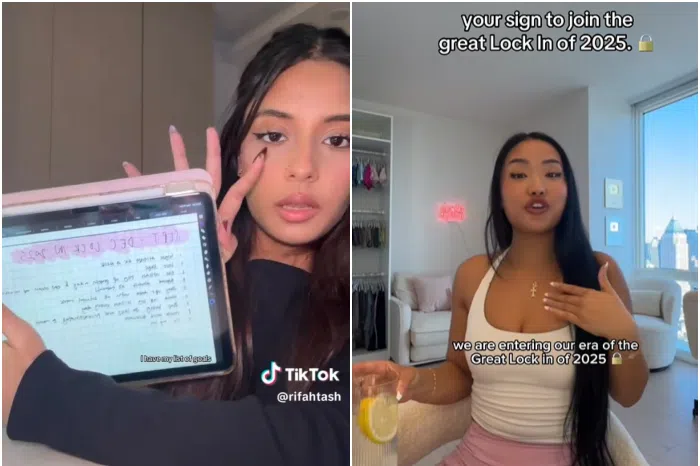The Great Lock In: The TikTok trend helping some young people salvage their 2025
Sign up now: Get ST's newsletters delivered to your inbox

On TikTok, young people across the globe have decided to embark on the “Great Lock In”, where targets have to be achieved within the last third of 2025.
PHOTOS: SCREENFRAB FROM RIFAHTASH/TIKTOK, LENALIFTS/TIKTOK
Follow topic:
- "The Great Lock In" is a TikTok trend where users set and pursue self-improvement goals from September to December. Participants aim to achieve results within this focused timeframe.
- Two Singaporeans, Eric and Rifah, are participating by improving diet, exercise, and finances. Both have seen progress, but struggle balancing goals with daily life.
- Psychologists note the trend can boost motivation but risks burnout.
AI generated
SINGAPORE – While some are already scribbling down their New Year’s resolutions with 2026 on the horizon, some others are not giving up on 2025 just yet.
On TikTok, young people across the globe have decided to embark on the “Great Lock In” – a twist on the Gen Z slang “locking in”, which means to hyper-focus on a task.
There are about 12,800 posts on TikTok tagged with the Great Lock In, where users embark on goals to be achieved within the last third of 2025 (from Sept 1 to Dec 31).
These goals often include self-improvement efforts such as eating clean, being consistent in working out or finishing a number of books a month.
At the halfway mark, The Straits Times checks in on the progress of two Singaporeans attempting the challenge and how it has changed them.
Living alone, living better
Soon after moving out of his family home in June, 31-year-old banking executive Eric found that living on his own led to his wallet shrinking but his waistline expanding.
Aside from his major expense – $2,500 in monthly rent – his $600 monthly food bill was another concern, largely due to him ordering take-out almost every day.
After coming across the idea of the Great Lock In in late August, Eric, who declined to give his full name, was inspired to make a change.
His targets included walking at least 10,000 steps a day, eating fast food only once a month, saving around $1,000 a month and cleaning his room weekly.
Eric began his Great Lock In by deleting food delivery apps from his phone.
At the end of October, he told ST that he has now become “friends” with the oven and new cooking equipment, as he has started making his own meals to cut calories and food expenses.
He admits that he has had a few “cheat” meals – through his friends’ delivery apps – but has remained diligent and not reinstalled the apps on his own phone or reverted to old eating habits.
To meet his $1,000 savings target, Eric said he has put a halt to his weekend spending sprees, such as trips to nearby countries, and has also used the challenge to admit to himself that he had a “spending problem” and that much of it was frivolous.
Getting school back on track
On TikTok, a majority of the Locked In videos are curated by women in their 20s and 30s.
One of them is Nanyang Technological University (NTU) student Rifah Tashfiah Mazumder.
The 22-year-old’s resolutions for 2025 – namely eating clean, bucking up on her academics and hitting the gym more often – fell flat after she took multiple holidays during the May to July university summer break. She suffered from jet lag and illness, leading to her falling behind on schoolwork when classes resumed.
“My university semester started in August, and it just felt like the perfect time to pick myself up and lock in – to ensure the remaining third of the year goes as well as I can make it,” said Ms Rifah, who also films content for her TikTok page.
To “turn this year around”, her Great Lock In comprised targets such as getting her sleep schedule back on track, going to the gym four times a week and indulging in more self-care, preparing her own meals and focusing on both studies and content creation.
In an Oct 18 TikTok video, Ms Rifah shared with her 22,500 followers that there have been hits and misses.
She has been going to the gym three times a week instead of four – which she lauded as a “good enough” effort – and added that she has been eating clean and not indulged in fast food in “a long time”.
She admitted she has not been fully up to date with her schoolwork, but hopes that she will get better at it – with half of the challenge still to go.
She also said it has been challenging juggling three different main tasks – school, producing social media content and tutoring, which she has done for three years.
Balance important
Dr Annabelle Chow, principal clinical psychologist of Annabelle Psychology, told ST that the trend carries potential benefits, such as giving participants a sense of purpose and motivation.
Sharing one’s progress online fosters accountability, she said, adding that reaching these goals can boost confidence and provide a sense of accomplishment.
But Dr Chow said that there can also be risks if it is taken too far, such as stress or burnout from trying to stick to a super strict routine.
“It is important to find the right balance. Healthy ambition is great, but too much competitiveness can take a toll on one’s mental health,” she said.
Associate Professor Ma Xiangyu of NTU’s Sociology department noted that habits are rarely changed according to an arbitrarily defined timeline.
Habits are more likely to be profoundly influenced by seminal events, such as one’s first break-up, front-line grief, a medical setback or personal failure, he added.
Trends such as the Great Lock In are more about the fun of talking about goals and socialising with like-minded individuals with similar aspirations, Prof Ma said.
Even halfway through, Eric is convinced of the benefits.
“I’m actually excited to see the results at the end of at least the end of the challenge, seeing that I feel more energised and good just after (a few) weeks,” he said. “I know it will be much more rewarding on Dec 31.”
Additional reporting by BNB Diviyadhaarshini


